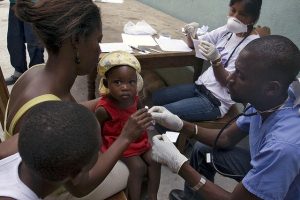
Combatting Obesity: A Call to Action for Healthier Lives in the Haitian Community
Introduction:
Obesity is a global health concern that affects communities worldwide, and the Haitian community is no exception. As the prevalence of obesity rises, it becomes crucial to address the unique challenges faced by the Haitian population. By engaging in obesity advocacy tailored to the cultural context, we can work towards creating a healthier future for the Haitian community.
Understanding the Challenge:
Obesity in the Haitian community is influenced by a combination of genetic, cultural, and socio-economic factors. Traditional diets rich in carbohydrates and fats, coupled with a shift towards sedentary lifestyles, contribute to the rising rates of obesity. Understanding the roots of the issue is essential to developing effective and culturally sensitive strategies for advocacy.
Cultural Sensitivity in Advocacy:
Cultural sensitivity is paramount when addressing health issues within any community, and the Haitian community is no exception. Advocacy efforts should acknowledge and respect the cultural significance of traditional foods, while also promoting healthier alternatives. By integrating cultural practices into obesity prevention programs, we can encourage positive lifestyle changes without compromising the cultural identity of the community.
Promoting Healthy Lifestyle Choices:
Obesity advocacy in the Haitian community should focus on promoting healthy lifestyle choices that are realistic and sustainable. This includes encouraging regular physical activity, educating individuals about portion control and balanced nutrition, and fostering a supportive environment for making healthier food choices. Community-wide initiatives, such as fitness classes, nutrition workshops, and support groups, can provide practical tools and resources to combat obesity.
Preventing Childhood Obesity:
Addressing obesity in the Haitian community also requires a specific emphasis on preventing childhood obesity. Engaging with parents, educators, and healthcare professionals to promote healthy habits in children can have a profound impact on their future well-being. School-based programs, community events, and partnerships with local organizations can contribute to creating an environment that nurtures healthy development from an early age.
Access to Affordable and Nutritious Food:
In many cases, limited access to affordable and nutritious food is a significant contributor to obesity. Advocacy efforts should collaborate with local farmers, markets, and policymakers to increase the availability of fresh and healthy food options. Supporting initiatives that make nutritious foods more accessible and affordable empowers the community to make healthier choices for themselves and their families.
Cultivating Community Support:
Building a network of support within the Haitian community is essential for the success of obesity advocacy initiatives. By collaborating with community leaders, healthcare professionals, and grassroots organizations, we can create a united front against obesity. Supportive networks provide encouragement, accountability, and shared resources, fostering a sense of collective responsibility for the community’s health.
Conclusion:
Obesity advocacy in the Haitian community requires a comprehensive and culturally sensitive approach that recognizes the unique factors contributing to the issue. By promoting healthy lifestyle choices, preventing childhood obesity, addressing access to nutritious food, and cultivating community support, we can work towards creating a healthier future for the Haitian community. Together, we can empower individuals to make positive changes and build a legacy of well-being that spans generations.

